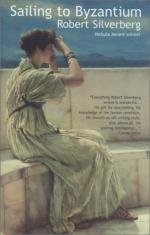|
This section contains 1,716 words (approx. 6 pages at 300 words per page) |

|
SOURCE: Campbell, Harry Modean. “Yeat's “Sailing to Byzantium.” Modern Language Notes 70, no. 8 (December 1955): 585-89.
In the following essay, the author refutes the interpretations of the poem as magical rather than religious and as an assertion of immortality through art as “fabricated thing,” and suggests instead that Byzantium is Yeats's “devoutly religious version of the New Jerusalem” where “the poet, the 'dying animal,’ is primarily concerned, not with the art, but with the spiritual life visibly represented by the art.”
The numerous analyses of Yeats's “Sailing to Byzantium” seem to fall into two main groups: a minority of critics feel as does John Crowe Ransom that the poem is “more magical than religious … and its magnificence a little bit forced”1, the great majority, however, praise it highly for its perfect structure and its magnificent exaltation of art. Typical of this second group are Louis MacNeice, who says: “Yeats is...
|
This section contains 1,716 words (approx. 6 pages at 300 words per page) |

|


